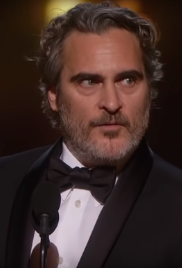[Start of speech]
God! I’m full of so much gratitude right now. I do not feel elevated above any of my fellow nominees or anyone in this room, because we share the same love, the love of film. This form of expression has given me the most extraordinary life. I don’t know what I’d be without it. But I think the greatest gift that it’s given me and many of us in this room is the opportunity to use our voice for the voiceless.
I’ve been thinking a lot about some of the distressing issues that we are facing collectively, and I think at times we feel or we’re made to feel that we champion different causes. But for me, I see commonality. I think whether we’re talking about gender inequality or racism or queer rights or indigenous rights or animal rights, we’re talking about the fight against injustice. We’re talking about the fight against the belief that one nation, one people, one race, one gender, or one species has the right to dominate, control, and use and exploit another with impunity.
I think that we’ve become very disconnected from the natural world and many of us what we’re guilty of is an egocentric worldview, the belief that we’re the center of the universe. We go into the natural world, and we plunder it for its resources. We feel entitled to artificially inseminate a cow, and when she gives birth, we steal her baby even though her cries of anguish are unmistakable. Then we take her milk that’s intended for her calf, and we put it in our coffee and our cereal.
I think we fear the idea of personal change, because we think that we have to sacrifice something, to give something up. But human beings at our best are so inventive and creative and ingenious, and I think that when we use love and compassion as our guiding principles, we can create, develop, and implement systems of change that are beneficial to all sentient beings and to the environment.
I’ve been a scoundrel in my life. I have been selfish, I’ve been cruel at times, hard to work with, and I’m grateful that so many of you in this room have given me a second chance. I think that’s when we’re at our best, when we support each other. Not when we cancel each other out for past mistakes, but when we help each other to grow, when we educate each other, when we guide each other towards redemption. That is the best of humanity.
When he was 17, my brother wrote this lyric. He said, “Run to the rescue with love and peace will follow.”
Thank you.
[End of speech]
Print the speech – Word Document or PDF


